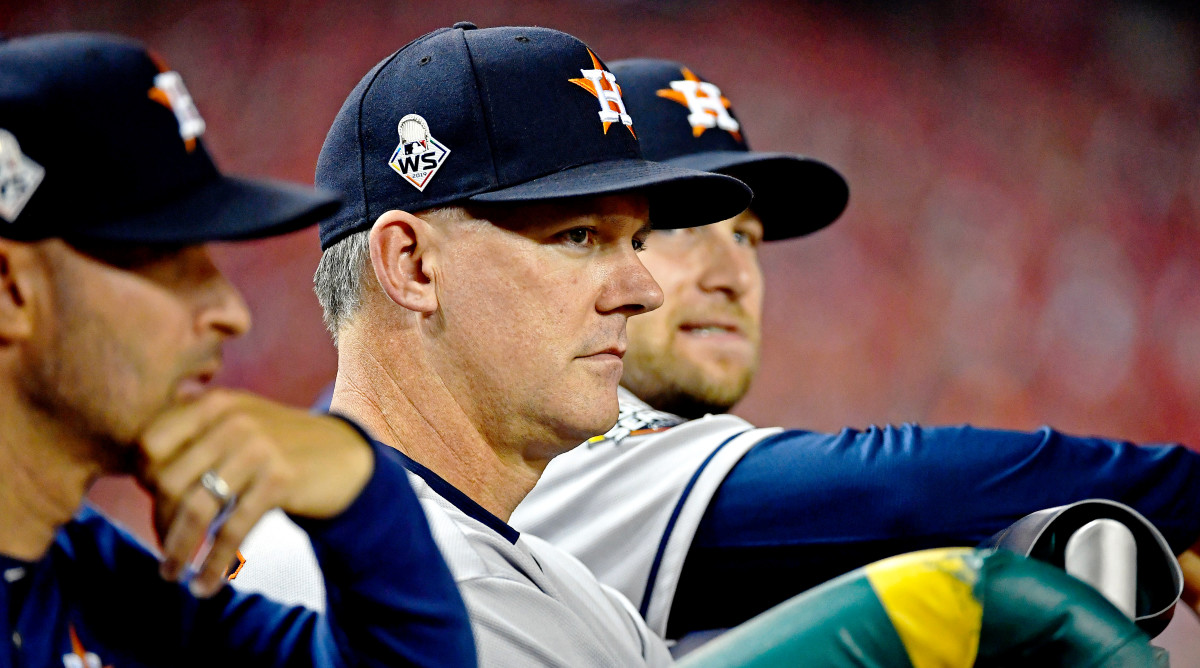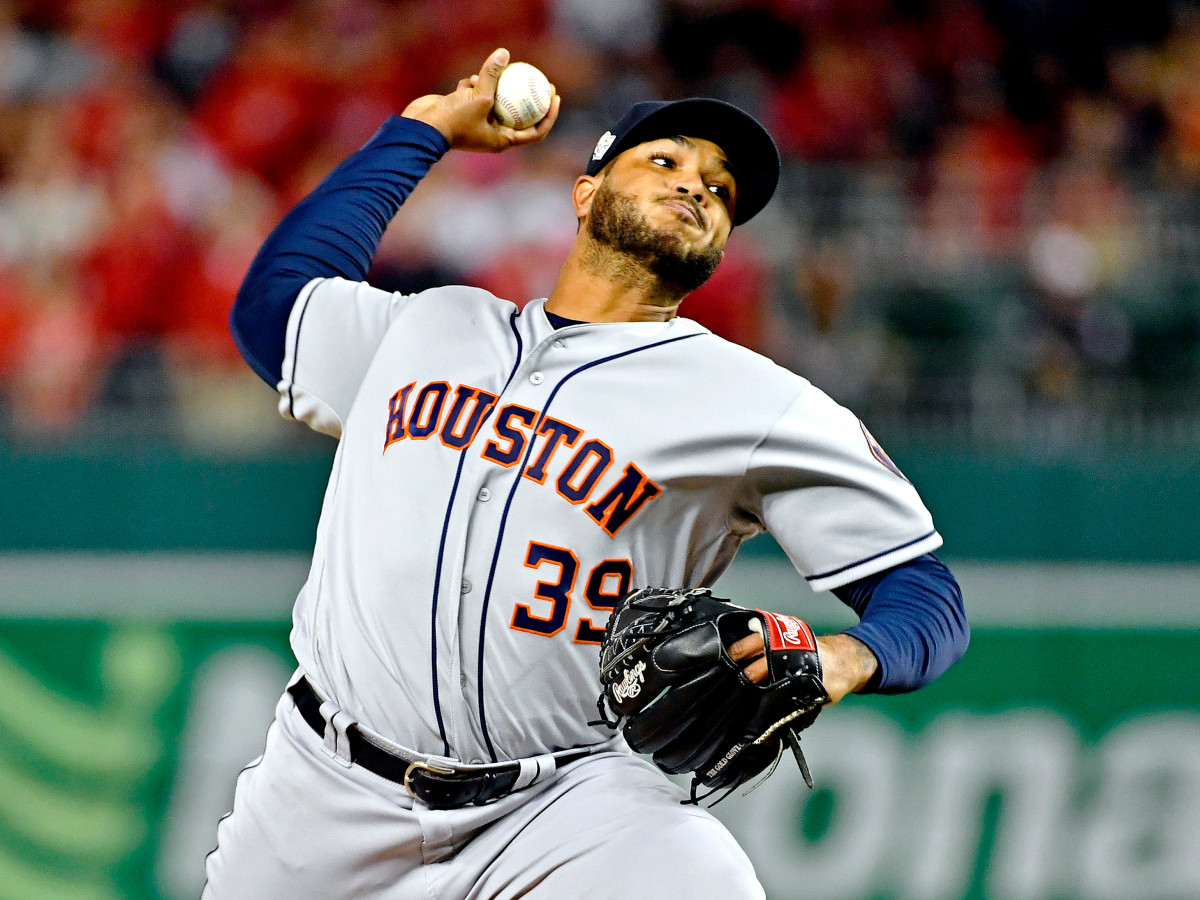A.J. Hinch Out-Manages Davey Martinez in First 'Old-Time Baseball' Game of World Series


WASHINGTON – This is why the next time some checkers-loving, dumb-it-down proponent tells you they ought to kill National League baseball, you tell them to leave baseball chess alone. This is why fans at Nationals Park were on their feet most of World Series Game 3, even though their home team scored just one run. This is why the Astros are back in the series.
As the World Series returned not just to Washington but also to National League rules, Astros manager A.J. Hinch won the chess match against Nationals manager Davey Martinez. And he did so despite another sloppy outing from Zack Greinke, despite Ryan Pressley being kicked out of Hinch’s Circle of Trust for a night, and despite no lefty pitcher against a lineup with three lefties among its top five hitters. Hinch won the battle, 4-1—with some huge game-saving help from his first lieutenant on the field, catcher Robinson Chirinos.
“This,” Houston ace Justin Verlander said, “was old-time baseball. Old-time baseball from like 10 years ago. Tension, traffic, strategy, decisions… People were standing up most of the time. These are the two best teams in baseball at putting the ball into play. It should be like this. And yes, our manager managed a hell of a game.”
Staring at a must-win game in Game 3 and a bullpen game in Game 4, Hinch managed the game like a driver taking a sharp bend on two of the car’s four wheels: about as aggressively as possible and still living to tell about it. He became the first manager to win a World Series game using six pitchers to allow only one run.
On the other side, Martinez tapped the brakes and put his emergency flashers on. He elected a more passive posture. It was the fourth inning when Victor Robles, representing the tying run for the Nationals, was standing at third with one out. The pitcher’s spot was due up next for Washington, the kind of pressure point that doesn’t exist in the Checkers League, more commonly referred to as the American League.
Just about any ball in play would mean a tie game for the Nationals. Martinez had Howie Kendrick, one of his best contact hitters, on the bench. The safe play for Martinez was to let his pitcher, Anibal Sanchez, take the at-bat, and defer going to his shallow bullpen for as long as possible. That would be the default regular season move, and an understandable one.
The aggressive move—the damn-the-torpedoes World Series move—would be to hit for Sanchez and play for the tying run.
Joe Ross was throwing in the bullpen, so Martinez was at least thinking about it. Sanchez, aware of the urgency needed in the World Series, didn’t leave the on-deck circle. He kept looking back to the dugout, waiting for instructions. Finally, hitting coach Kevin Long hopped down the dugout stairs to get the attention of Martinez so he could let Sanchez know about the decision. Martinez motioned to the plate, “Hit.”
Sanchez did not put the ball in play. He struck out against Greinke. Trea Turner bounced back to Greinke to end the inning.
Here’s the kicker: left in the game to take a high-leverage at-bat, Sanchez gave Martinez only four more outs while giving up two more runs.
“I seriously thought about it, yeah,” Martinez said about hitting for Sanchez. “But you know what, I like the way Sanchez was pitching, he's only had 60 pitches. I thought the way things were going, like I said, we put the ball in play, just couldn't put the ball in play with runners in scoring position.”
Hinch took a more proactive approach. He pulled Greinke one out from qualifying for a win in the fifth. Greinke has a 4.30 postseason ERA, sixth worst among the 52 pitchers to have thrown 75 innings in the postseason. He has started six times in the postseason on the road and won none of them, joining Jerry Reuss and Adam Wainwright as the only pitchers to go 0-for-the-road with that many tries. Greinke pitches in the postseason haltingly, like that annoying friend who looks over menu like it’s the Periodic Table and can’t make a decision.

Hinch brought in a rookie, Josh James, to face Ryan Zimmerman, the old lion, with runners at second and third to protect a 3-1 lead. The ballpark stirred into a frenzy, especially with this being the first World Series game in Washington since 1933 and Mr. National in the box in a made-for-TV moment.
“I mean it's Ryan Zimmerman in this ballpark,” Hinch said. “I'm well aware it's his ballpark, it feels like.”
What followed next was the at-bat of the night and why veteran catching is so important this time of year. The at-bat took a dramatic turn at 0-and-2 when Zimmerman jack-knifed so forcefully out of the way of a 98-mph missile from James that he wound up face down in the dirt, dazed.
When Zimmerman finally got upright—only after Martinez and the trainer checked on the well-being of a hitter who wasn’t even hit with a pitch—James dusted him again.
Then James came back with a nasty slider below the strike zone. Zimmerman somehow fouled it off, a Herculean achievement for someone who practically had just seen his 15-year-career with the Nats flash by. When Zimmerman then also fouled off the yin to the yang of the previous pitch—a heater upstairs—Chirinos called time out and marched to the mound. Those swings, Chirinos thought, were just too good.
“I was worried that [Asdrubal] Cabrera had the signs,” said Chirinos, referring to the Washington runner at second who had watched six pitches from second base.
“We’re going to go changeups here,” Chirinos said to James. “No spin.”
A hanging slider could mean three runs, and Zimmerman was on the fastball. He had not yet seen James’ changeup. By going to the mound and calling the pitches in advance, Chirinos also could go back behind the plate and not worry about Cabrera stealing the signs—that’s because there would be none.
James threw back-to-back changeups. Zimmerman took the first for a ball, but swung through the next to end the inning.
It was brilliant and gutsy baseball by Chirinos. All year James had thrown only six full-count changeups, and not well—those six pitches led to four walks and one hit on those pitches. Full-count changeups are not his strong suit. But now Chirinos led him to double up on changeups with the game in the balance, and it worked.
“That moment felt like power and a new look was going to be what we needed,” Hinch said of using James on Zimmerman. “Josh James came in and did his job.”
Hinch still needed to get 12 more outs without Pressly or a lefthander. He chose Brad Peacock to start the endgame, but sent word to the bullpen that his most reliable reliever, Will Harris, should be ready to face Turner when the top of the lineup came around. So Harris was on alert and ready even before Peacock walked two with one out. A prepped Harris mowed through five straight batters.
Joe Smith took care of the bottom of the lineup for three more outs, and closer Roberto Osuna cleaned up by getting the last three against the top of the lineup.
Hinch’s foresight was impressive. He lined up the game so that Turner, Adam Eaton, Anthony Rendon and Juan Soto—the Nationals’ 1-through-4 hitters—saw only the starting pitcher and his two best relievers. Those hitters went 1-for-8 against Harris and Osuna, and neither scored nor knocked in a run all night.
Hinch has acquitted himself well all week, certainly the best on the management side of the Houston organization. Brandon Taubman revealed himself as much as he embarrassed himself with his profane, insulting diatribe directed at female reporters, including SI’s Stephanie Apstein. GM Jeff Luhnow showed not an ounce of understanding with his lack of an immediate and full apology. The team’s public relations department should be ashamed of its initial blame-it-on-Apstein press release, which revealed an institutional problem that washes back on owner Jim Crane.
Houston’s management let an awful situation linger like a dead skunk under the porch for a week. It didn’t have anything to do with how the Astros played baseball, but it atomized the air around the World Series for the worse.
Hinch was the one Astros person who gave a reasoned response in real time, without spin or self defense. The questions to Hinch about Taubman finally died down after six days. Then Game 3 happened, and Hinch gave another virtuoso performance.
Think about the best games you ever saw in the postseason, and chances they were played under National League rules. Game 7 of the 2001 World Series. Games 6 and 7 of the 2011 World Series. The 18-inning thriller last year in Los Angeles. Game 6 of the 1975 World Series, the last game at Fenway played without the DH. And yes, Game 5 of the 1933 World Series, until Friday night the last one played in Washington, a 10-inning thriller that Mel Ott won the for Giants with a 10th-inning home run.
This one doesn’t go into the classics category by any means, but it served as a reminder of how riveting “old-time baseball,” as Verlander called it, can be. Okay, so the managers did use 10 pitchers and the game took four hours, three minutes. But the ball was put in play 55 times and 28 batters reached base, which put stress on pitchers and gave the fans reasons to get on their feet and anticipate rallies.
This was a manager’s game. Greinke couldn’t get through five again—the third time in four postseason starts this year. The Nationals put 14 runners on base. But at every turn, Hinch and the bullpen had an answer. He used five relievers to get the last 12 outs without a run scoring against a red-hot lineup. His reward? Saturday night he has to do it all again.
